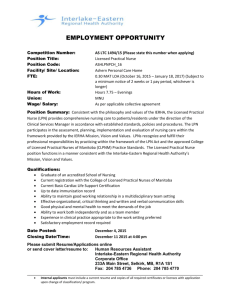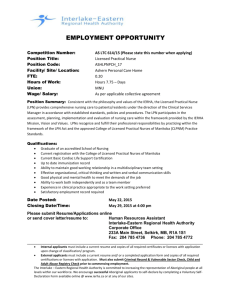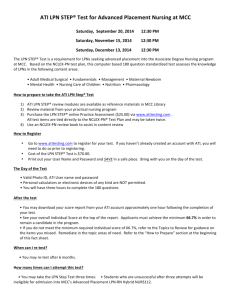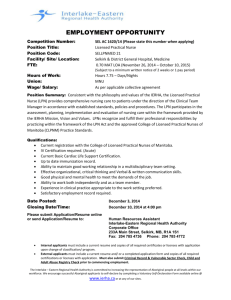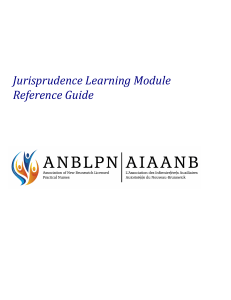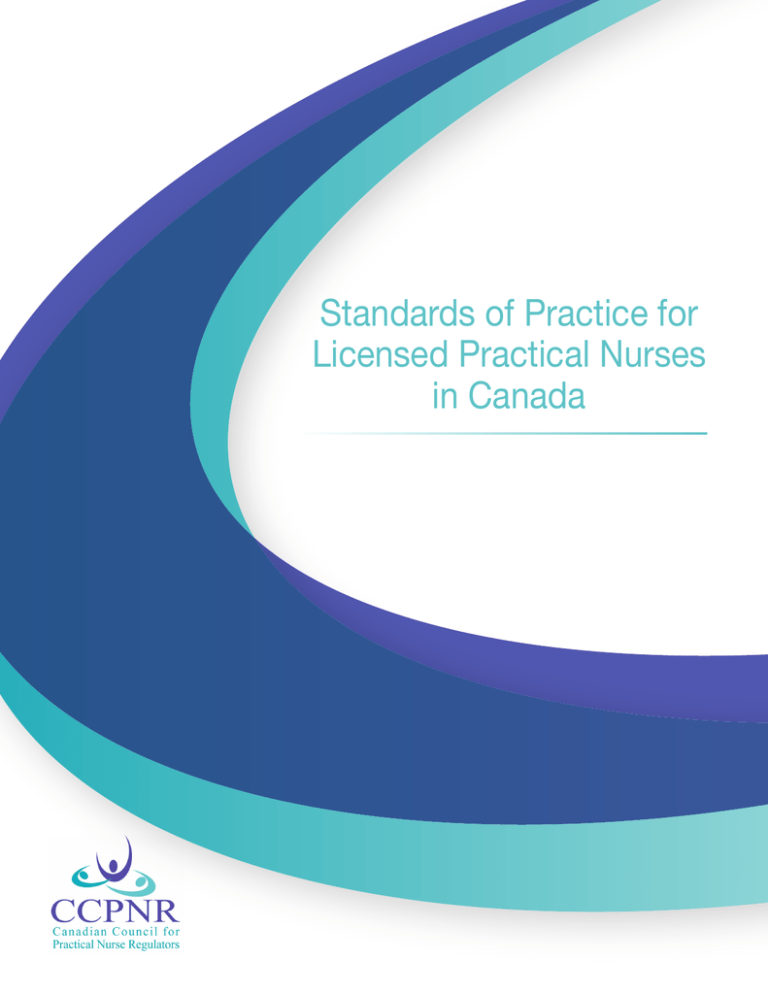
Standards of Practice for
Licensed Practical Nurses
in Canada
Foreword
The Canadian Council for Practical Nurse Regulators (CCPNR) is a federation of provincial and territorial
members who are identified in legislation, and responsible for the safety of the public through the regulation of
Licensed Practical Nurses (LPNs).
The Council of the CCPNR recognized the need for a single standards of practice across member jurisdictions.
The Standards of Practice are authoritative statements that define the legal and professional expectations of LPN
practice. In conjunction with the Code of Ethics for LPNs, they describe the elements of quality LPN practice
and facilitate mobility through inter-jurisdictional mutual understanding and agreement of expectations and
requirements for practice. This document also serves as a guide for curriculum development and for public and
employer awareness of the practice expectations of the LPN.
A steering committee from the representatives of all jurisdictions who license and/or regulate LPNs across
Canada (with the exception of Quebec) was identified to guide and advise the project. One World Inc. was
commissioned to research and develop the standards in collaboration with the steering committee. This document
was validated by the LPN community and key stakeholder groups across Canada and was approved by the Boards
of the respective regulatory authorities of the CCPNR’s Board members. The CCPNR thanks all participants who
contributed to the creation of this document.
The CCPNR approves and adopts the standards of practice for the LPN outlined in this document.
The opinions and interpretations in this publication are those of the author and do not
necessarily reflect those of the Government of Canada.
Available in French under the title:
Normes de pratique des soins infirmiers et infirmières auxiliaires autorisé(e)s au Canada
This project is funded in part by the Government of Canada’s Foreign Credential Recognition Program.
Copyright © 2013 CCPNR
All rights reserved. The reproduction, storage in a retrieval system or transmission in any form or by
any means (including electronic, mechanical, photographic, photocopying or recording) of any part
of this publication without the prior written permission from CCPNR (Canadian Council for Practical
Nurse Regulators) is an infringement of copyright law.
For information contact CCPNR:
Telephone: 709.579.3843 | Fax: 709.579.3095 | Email: chair@ccpnr.ca | Website: www.ccpnr.ca
2
Preamble
The Standards of Practice for Licensed Practical Nurses (LPNs)1 in Canada provide a national framework for LPN
practice. The Standards of Practice are authoritative statements that define the legal and professional expectations
of licensed practical nurse practice. In conjunction with the Code of Ethics for Licensed Practical Nurses,
they describe the elements of quality LPN practice and facilitate mobility through inter-jurisdictional mutual
understanding and agreement of expectations and requirements for practice.
The four broad standards are applicable to LPNs in all settings in which they practice. They provide the
benchmark to which LPNs are measured. Indicators accompany each standard and describe more specifically the
expectations for LPN practice. Neither the standards nor the indicators are in any order of priority.
As members of a self-regulating profession, LPNs are personally responsible for meeting the Standards of
Practice. The legislative responsibility for setting, monitoring and enforcing the Standards of Practice lies with
the provincial and territorial regulatory authorities.
The policies and practices of employing organizations do not relieve LPNs of accountability to meet these
standards of practice.
Where the legislation and this Standards of Practice document conflict, legislation will apply.
Standards of Practice
1. PROFESSIONAL ACCOUNTABILITY AND RESPONSIBILITY
2. KNOWLEDGE-BASED PRACTICE
3. SERVICE TO THE PUBLIC AND SELF-REGULATION
4. ETHICAL PRACTICE
Principles
Six principles provide the foundation on which the Standards were developed.
1. LPNs are self-regulating and accountable for providing safe, competent, compassionate and ethical care within the legal and ethical framework of nursing regulation.
2. LPNs are autonomous practitioners and work collaboratively with colleagues in health care to assess, plan and deliver quality nursing services.
3. LPN practice is client centred and includes individuals, families, groups and communities.
4. LPN standards are broadly based and address variations in client needs, provider competence, experience and environmental factors.
5. LPN standards allow for growth in the profession to meet changing approaches, treatments and technologies within the health care system.
6. LPN standards encourage leadership through self-awareness and reflection, commitment to individual and professional growth, and promotion of the best possible service to the public.
1 For the purposes of this document, the term “licensed practical nurse” also refers to “registered practical nurse.”
3
STANDARD 1:
Professional Accountability and Responsibility
Licensed Practical Nurses are accountable for their practice and responsible for ensuring
that their practice and conduct meet both the standards of the profession and legislative
requirements.
Indicators:
LPNs:
1.1. Practice to their full range of competence within applicable legislation, regulations, by-laws and employer policies.
1.2. Engage in ongoing self-assessment of their professional practice and competence, and seek opportunities for continuous learning.
1.3. Share knowledge and expertise with others to meet client needs. There is a requirement that knowledge and expertise be shared with respect to client needs. This also applies to mentoring and preceptor situations.
1.4. Recognize their own practice limitations and consult as necessary.
1.5. Identify and report any circumstances that potentially impede professional, ethical or legal practice.
1.6. Take action to avoid and/or minimize harm in situations in which client safety and well-being are compromised.
1.7. Incorporate established client safety principles and quality assurance/improvement activities into LPN practice.
1.8. Advocate in the interest of the public for continuous improvements in licensed practical nursing practice and health care environments that promote client-centred care. Expect nurses to advocate
as such.
1.9. Practice in a manner consistent with ethical values and obligations of the Code of Ethics for Licensed Practical Nurses.
1.10. Maintain documentation and reporting according to established legislation, regulations, laws, and employer policies.
1.11. Advocate for and participate in the development of policies and procedures that support evidence-
informed LPN practice.
4
STANDARD 2:
Knowledge-Based Practice
Licensed Practical Nurses possess knowledge obtained through practical nurse preparation
and continuous learning relevant to their professional LPN practice.
Indicators:
LPNs:
2.1. Possess current knowledge to support critical thinking2 and professional judgement.
2.2. Apply knowledge from nursing theory and science, other disciplines, evidence to inform decision-
making and LPN practice.
2.3. Access and use relevant and credible information technology and other resources.
2.4. Review and integrate relevant nursing research findings into LPN practice.
2.5. Maintain awareness of current trends and issues in health care and society that impact client and nursing outcomes.
2.6. Evolve their own LPN practice in response to changes and new developments affecting the profession.
2.7. Demonstrate understanding of their role and its interrelation with clients and other health care colleagues.
2.8. Collaborate in the development, review and revision of care plans to address client needs and preferences and to establish clear goals that are mutually agreed upon by the client and the health care team.
2.9. Provide holistic licensed practical nursing care considering the whole person, the environment and the concepts of health promotion, illness prevention, health maintenance, restoration and protection.
2.10. Recognize how LPN practice environments and other environmental factors affect professional practice and client outcomes, and develop/modify care plans to assure client safety and well-being.
2.11. Use critical inquiry3 to assess, plan and evaluate the implications of interventions that impact client outcomes.
Practice in a culturally competent4 manner.
2.12. 2.13. Modify and communicate to appropriate person changes to specific interventions based on the client’s responses.
2 An active and purposeful problem-solving process. It requires the practical nurse to advance beyond the performance of skills and
interventions to provide the best possible care, based on evidence-informed practice. It involves identifying and prioritizing risks and
problems, clarifying and challenging assumptions, using an organized approach to assessment, checking for accuracy and reliability of
information, weighing evidence, recognizing inconsistencies, evaluating conclusions and adapting thinking. Assessment Strategies Inc.
Exam Blueprint (2012).
3 This term expands on the meaning of critical thinking to encompass critical reflection on actions. Critical inquiry refers to a process
of purposive thinking and reflective reasoning whereby practitioners examine ideas, assumptions, principles, conclusions, beliefs
and actions in the context of nursing practice. The critical inquiry process is associated with a spirit of inquiry, discernment, logical
reasoning and application of standards. (Brunt, 2005; Jurisdictional Collaborative Process, 2006)
4 Cultural competence is defined as a set of congruent behaviors, attitudes, and policies that come together in a system, agency, or
among professionals and enables that system, agency, or those professionals to work effectively in cross-cultural situations.
5
STANDARD 3:
Service to the Public and Self-Regulation
Licensed Practical Nurses practice nursing in collaboration with clients and other members
of the health care team to provide and improve health care services in the best interests of
the public.
Indicators:
LPNs:
3.1. Engage clients in a therapeutic nurse-client relationship as active partners for mutual planning of and decisions about their care.
3.2. Collaborate with clients and co-workers in the analysis, development, implementation and evaluation of LPN practice and policy that guide client-focused care delivery.
3.3. Support and contribute to an environment that promotes and supports safe, effective and ethical practice.
3.4. Promote a culture of safety by using established occupational health and safety practices, infection control, and other safety measures to protect clients, self and colleagues from illness and injury.
Provide relevant and timely information to clients and co-workers.
3.5. 3.6. Demonstrate an understanding of self-regulation by following the standards of practice, the code of ethics and other regulatory requirements.
3.7. Attain and maintain professional registration/licensure with the regulatory authority of the jurisdiction in which they practice.
3.8. Practice within the relevant laws governing privacy and confidentiality of personal health information.
6
STANDARD 4:
Ethical Practice
Licensed Practical Nurses uphold, promote and adhere to the values and beliefs as described
in the Canadian Council for Practical Nurse Regulators (CCPNR) Code of Ethics.
Indicators:
LPNs:
4.1. Practice in a manner consistent with ethical values and obligations of the Code of Ethics for LPNs.
4.2. Recognize the impact of their own values and beliefs on nursing practice and nurse-client therapeutic relationships.
4.3. Identify ethical issues and communicate them to the health care team.
4.4. Develop ethical decision-making capacity and take responsible action toward resolution.
4.5. Advocate for the protection and promotion of clients’ right to autonomy, respect, privacy, confidentiality, dignity and access to information.
4.6. Maintain professional boundaries in the nurse/client therapeutic relationship at all times.
4.7. Communicate in a respectful, timely, open and honest manner.
4.8. Collaborate with colleagues to promote safe, competent and ethical practice.
4.9. Support and contribute to healthy and positive practice environments.
4.10. Practice with honesty and integrity to maintain the values and reputation of the profession.
7
References
Cross T., Bazron, B., Dennis, K., & Isaacs, M. (1989). Towards a Culturally Competent System of Care, Volume
I. Washington, DC: Georgetown University Child Development Center, CASSP Technical Assistance Center.
Isaacs, M. and Benjamin, M. (1991). Towards a Culturally Competent System of Care, Volume II, Programs
Which Utilize Culturally Competent Principles. Washington, DC: Georgetown University Child Development
Center, CASSP Technical Assistance Center.
8
www.ccpnr.ca

